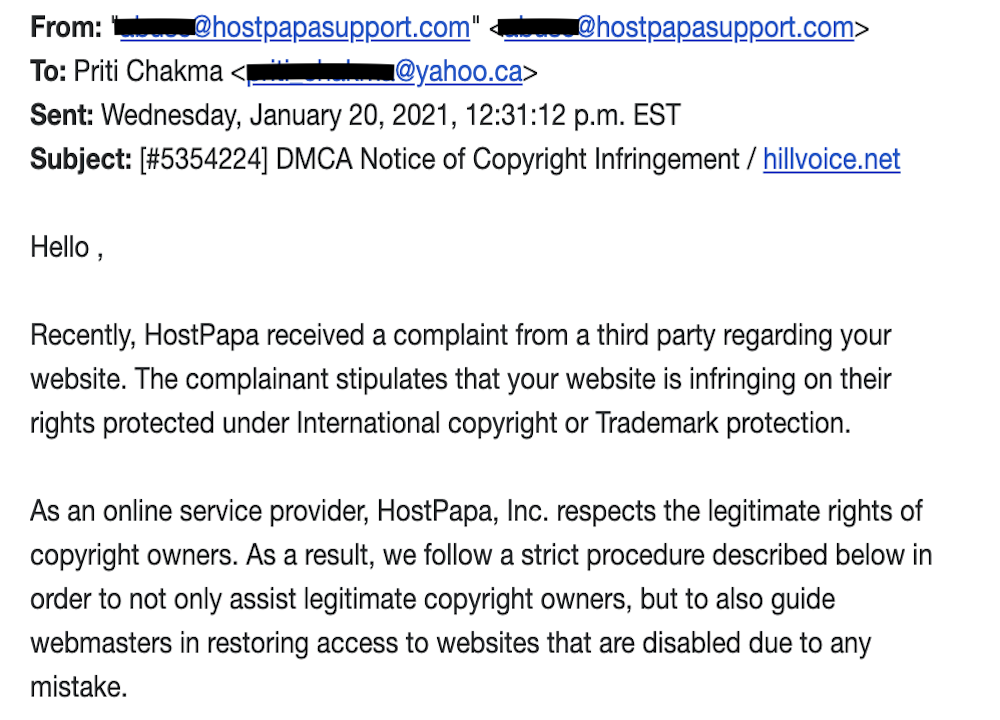Earlier this month, Netra News published a long story on how the Bangladesh government authorities were credibly suspected of making false copyright claims against websites and YouTube channels belonging to dissident Bangladeshis living abroad in order to close them down — something which they have been pretty successful at doing.
The way this is done, as the incidents reported in the Netra News story indicate, is that the Bangladesh government authorities — through their large number of sub-contractors — first set up dummy websites. Then they take content (videos or articles) already posted or published on targeted YouTube channels or websites, against which they want to launch the copyright strikes. They then republish the content on their dummy sites with an earlier date than the original published version, so that they can pretend they were the original publishers.
The dummy websites then complain to YouTube or the website’s internet hosts stating that they hold the copyright to the video or the article, and claim that the original publishers have committed an offence under the Digital Millennium Copyright Act (DMCA). This is a US law established to control copyright infringement, requiring online service providers to promptly remove the offending material. YouTube or the relevant internet hosts seem to undertake no due diligence on these claims and immediately write to the channel or website (that is, in fact, the real publisher of the video/article) stating that they have to remove the article or they will otherwise take the channel or website offline.
It becomes an Alice in Wonderland world — where the original publisher is accused of copyright violation by a website which is the one actually guilty of copyright violation against the original publisher!
Since the original website owners know that they are the original publisher of the video/article, they are very reluctant to remove the content — and are placed in a quandary. Do they remove the video/article, or risk their site being taken down? This simple technique is surprisingly successful and has, as set out in the Netra News article, resulted in websites and YouTube channels being closing down.
In a strange quirk, Netra News has recently come across an example where the Bangladesh authorities (apparently) have set up a dummy website mimicking Netra News itself in order to try to close down another news website, hillvoice.net — an online news portal on issues relating to indigenous rights and the Chittagong Hill Tracts.
The dummy website that has been created is netranews.info — similar to our actual website, netra.news, with the imposter site using Netra News’s actual logo. A person called “Tasnim Khalil” — slightly differently spelled, but the same name as Netra News’s actual editor-in-chief, Tanseem Khalil — has written a number of complaints to the site host of hillvoice.net claiming that the website had infringed the copyright of netranews.info by republishing particular articles. Of course, the article in question was in fact originally published on hillvoice.net.
The most recent example involves an article titled “Attempt by army member to rape a Jumma woman in Bandarban’s Rajvila”. This article was dated as published on the hillvoice.net website on January 19, 2021. In its complaint to hillvoice’s hosting company Host Papa, however, the dummy website, netranews.info, claimed that the article was originally published on August 20, 2013. The date is notable as the alleged rape incident is reported (in both articles!) to have taken place on January 18, 2021 — seven years after netranews.info supposedly first reported on it. That is quite some level of clairvoyance! Indeed, netranews.info, the dummy website, could not have posted the report in 2013 at all as it only came into existence on October 7, 2020.
The absurdity of the claim could easily have been recognised by the host provider with less than five minutes of inquiry. In this case, the copyright claim failed and hillvoice.net continues to operate. This is because hillvoice.net has changed its website host to Host Papa, which considered the detailed responses to the copyright complaints . However in November last, when hillvoice.net used a different internet host, its website was closed down for a short period of time — the reason why the website changed its host.
There is no conclusive evidence at present to prove that the people involved in setting up these dummy websites and making these false copyright claims operate on behalf of the Bangladesh government authorities. However, we do know that Bangladesh authorities are involved in very similar activities in relation to Facebook.
Executive editor of the Hill Voice, Priti Bindu Chakma certainly thinks that the “Army and the DGFI may have [been] involved” in the copyright claims against his website. Who else could be involved in such a systematic copyright strike campaign?
